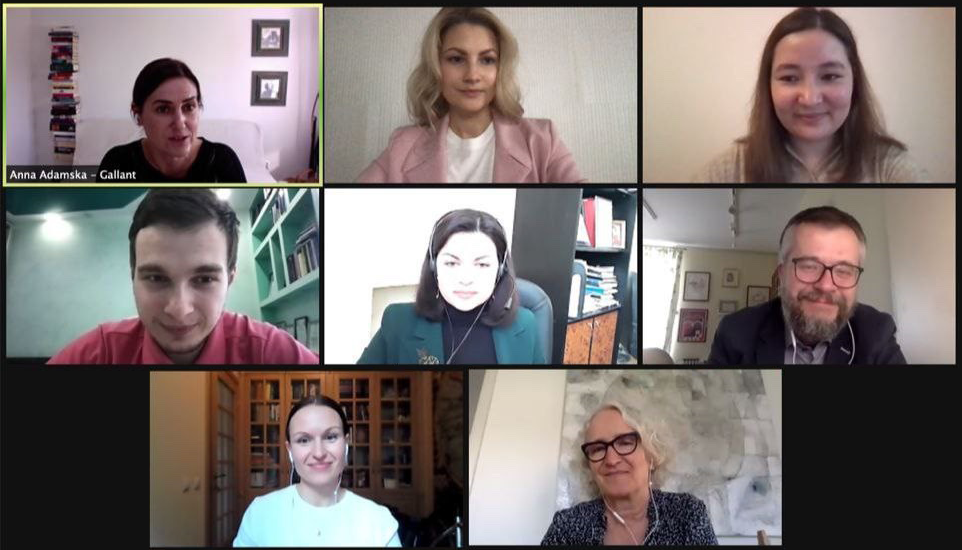
ON APRIL 19, THE EU PROJECT “PRAVO-JUSTICE” HELD AN ONLINE MEETING AS PART OF THE RULE OF LAW DISCUSSIONS ON THE TOPIC “JUDGES’ RIGHT TO FREEDOM OF EXPRESSION – IS THERE A LIMIT?”.
THE AIM OF THE MEETING WAS TO DISCUSS ISSUES RELATED TO THE FREEDOM OF EXPRESSION OF JUDGES’ VIEWS AND TO DEFINE ITS LIMITS. Among the panelists were international experts from the EU Pravo-Justice Project, former Head of Communications at the National Judicial Administration of Lithuania Zyvile Navickaitė-Babkin, retired judge Jaroslaw Gwizdak (Poland), judge of the Espoo District Court Marjo Naapi (Finland), and Olena Fonova, judge-speaker of the Economic Court of Luhansk Oblast, coordinator of the Donbas Regional Council for Justice Reform(RRJR).
Traditionally, the discussion was moderated by Anna Adamska-Gallant, a leading international expert on judicial reform (Poland).
The exercise of the right to freedom of thought and expression by judges is a prerequisite for the development of a democratic state in which the judiciary communicates with society.
However, when expressing their opinions during the administration of justice and outside of court, judges must comply with the Code of Judicial Ethics.
In particular, a judge may not comment in the media on cases pending in court and criticize court decisions that have entered into force or the behavior of his or her colleagues if such a comment harms the authority of the judiciary.
In EU countries, it is common practice for judges to comment on and explain the reasons for their decisions.
The application of a similar procedure in Ukraine would help citizens better understand the specifics of judges’ work and their decisions, which often cause public outcry due to lack of awareness.
Žyvilė Navickaitė-Babkin shared the Lithuanian experience of commenting on a court case by the judge who made the decision: “Although Lithuanian courts have judges-speakers, the trend is now spreading when judges themselves explain their decisions. To this end, we are training all judges to master communication skills so that they are ready to explain their decisions in public.”
Yaroslav Hvizdak noted that criticism of judges will always exist, but its intensity can be reduced by communicating with the public.
“We need to get used to criticism. However, in order to reduce the intensity of this criticism, the judiciary needs to provide explanations for the most high-profile court cases. After all, explanations of court cases will contribute to the development of critical thinking of citizens and, accordingly, reduce the level of criticism and its impact on the judiciary,” he shared his thoughts. “The activities of the courts, including the procedural ones, should be clear. As a rule, court decisions are written in complicated legal language that is not understandable to an average citizen. This creates the possibility of manipulating public opinion and appealing to emotions rather than facts. Therefore, in my opinion, the court should explain its decisions, especially in high-profile cases, so that society understands that this is what the law says and that the court cannot fail to apply it. This is especially true for certain procedural actions of the court when the judge has no alternative. For example, when choosing a preventive measure in the form of detention, when the law provides for the right to bail for a person against whom a preventive measure has been applied.”, – emphasized Olena Fonova, judge-speaker of the Economic Court of Luhansk Oblast, coordinator of the Donbas RRRP.
На важливості комунікації суддів зі ЗМІ наголосила і Живілє Навіцкайте-Бабкін: «Судова гілка влади має спілкуватися з журналістами не лише тоді, коли є певна резонансна справа, але й повинна здійснювати проактивну комунікацію: регулярно пояснювати певні особливості законів, організувати неофіційні зустрічі. Оскільки, коли судді пояснюють певні законодавчі зміни, тим самим вони створюють певний зв’язок із журналістами. Найголовніше у комунікації суддів зі ЗМІ – показати готовність до співпраці з журналістами».
Марйо Наапі вказала: «Ми маємо поширювати як серед громадян, так і серед суддів думку про те, що суддів мають сприймати як надавачів судових послуг. А особи, які надають послуги, не можуть ховатися, вони повинні бути на виду і повинні комунікувати».
Наголошуючи на вже значних змінах у судах України, Анна Адамська-Галлант зазначила: «Важливо інформувати громадськість про вже існуючі позитивні сторони судів України, але щоб у суспільства змінилась думка про судову владу та зріс рівень довіри – потрібен час».
Усі експерти погодилися, що важливо й надалі вибудовувати ефективну та проактивну комунікацію з медіа.
Стратегічні комунікації допоможуть підвищити довіру громадськості до суду.


